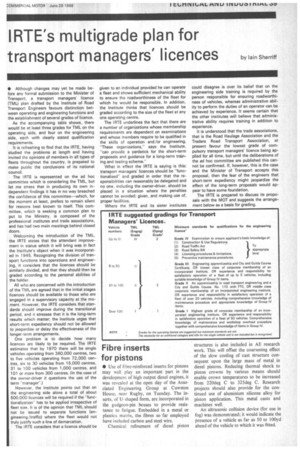IRTE's multigrade plan for
Page 41

If you've noticed an error in this article please click here to report it so we can fix it.
transport managers' licences by lain Sherriff
• Although changes may yet be made before any formal submission to the Minister of Transport, a transport managers' licence (TML) plan drafted by the Institute of Road Transport Engineers favours distinction between operating and engineering functions and the establishment of several grades of licence.
As the accompanying table shows, there would be at least three grades for TML on the operating side, and four on the engineering side, each with clearly stated qualification requirements.
It is refreshing to find that the IRTE, having studied the problems at length and having invited the opinions of members in all types of fleets throughout the country, is prepared to make public the conclusions of its national council.
The IRTE is represented on the ad hoc committee which is considering the TML, but let me stress that in producing its own independent findings it has in no way breached the confidence of this committee—which, for the moment at least, prefers to remain silent for reasons best known to itself. This committee, which is seeking a common plan to put to the Ministry, is composed of the professional institutes and trade associations, and has had two main meetings behind closed doors.
Welcoming the introduction of the TML, the IRTE states that the attendant improvement in status which it will bring was in fact the Institute's object when it was incorporated in 1945. Recognizing the division of transport functions into operations and engineering, it considers that the licences should be similarly divided, and that they should then be graded according to the personal abilities of the holder.
All who are concerned with the introduction of the TML are agreed that in the initial stages licences should be available to those who are engaged in a supervisory capacity at the moment. However, the IRTE considers that standards should improve during the transitional period, and it stresses that it is the long-term results which matter; the Institute urges that short-term expediency should not be allowed to jeopardize or delay the effectiveness of the longer-term arrangements.
One problem is to decide how many licences are likely to be required. The IRTE estimates that by 1970 there will be single vehicles operating from 360,000 centres, two to five vehicles operating from 72,000 centres, six to 30 vehicles from 15,000 centres, 31 to 100 vehicles from 1,000 centres, and 101 or more from 300 centres. (In the case of the owner-driver it questions the use of the term "manager".) However, the Institute points out that on the engineering side alone a total of about 500,000 licences will be required if the "functionalization" has to be applied irrespective of fleet size. It is of the opinion that TML should not be issued to separate functions (engineering /traffic) where the fleet would not truly justify such a line of demarcation.
The IRTE considers that a licence should be given to an individual provided he can operate a fleet and shows sufficient mechanical ability to ensure the roadworthiness of the fleet for which he would be responsible. In addition, the Institute thinks that licences should be graded according to the size of the fleet at any one operating centre.
The IRTE underlines the fact that there are a number of organizations whose membership requirements are dependent on examinations and whose members require to be qualified in the skills of operation and /or engineering. "These organizations," says the Institute, "can provide a yardstick for the short-term proposals and guidance for a long-term training and testing scheme."
What in effect the IRTE is saying is this: transport managers' licences should be "functionalized" and graded in order that the responsibilities can reasonably be delegated and no one, including the owner-driver, should be placed in a situation where the penalties cannot be avoided; given, and making use of, proper facilities.
Where the IRTE and its sister institutes
could disagree is over its belief that on the engineering side training is required by the person responsible for ensuring roadworthiness of vehicles, whereas administrative ability to perform the duties of an operator can be achieved by experience. It seems certain that the other institutes will believe that administrative ability requires training in addition to experience.
It is understood that the trade associations, that is the Road Haulage Association and the Traders Road Transport Association, at present favour the lowest grade of compulsory transport managers' licence being applied for all time, but until the deliberations of the ad hoc committee are published this cannot be confirmed. If, however, this is the case and the Minister of Transport accepts this proposal. then the fear of the engineers that short-term expediency might jeopardize the effect of the long-term proposals would appear to have some foundation.
The IRTE is prepared to discuss its proposals with the MOT and suggests the arrangement below as a basis for grading.
























































































































